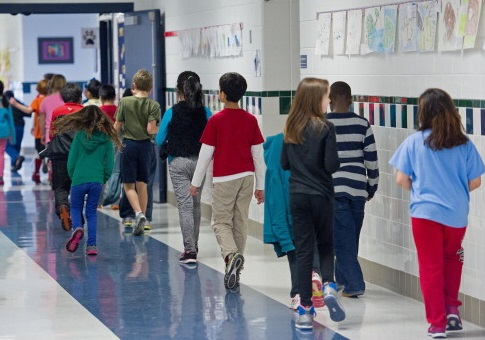A "transgender toolkit" for public schools in Minnesota advises teachers to call children "scholars" instead of boys and girls.
The guidelines were approved Wednesday by the "School Safety Technical Assistance Council" and will be distributed to Kindergarten through 12th grade public schools and charter schools throughout the state. The toolkit attempts to "ensure a safe and supportive transition" for children becoming a different gender at school.
The toolkit allows for boys who identify as girls to use the girls' bathroom, and tells teachers to ask kids what their "preferred pronouns" are.
The Minnesota Department of Education encourages parents to have "acceptance and support of their child's gender identity" if they want their child to perform well at school.
"Schools should not assume a student's name or pronoun," the toolkit states. "School officials should ask the student and use the requested name and pronouns."
The department says no legal documents are needed to change a student's name or gender in school records. The department also said that teachers must call students by whatever name they choose to ensure that bullying does not occur.
"When students are referred to by the wrong pronoun by peers or school staff, students may feel intimidated, threatened, harassed or bullied," the toolkit states. "School staff can ensure a more respectful environment for all students when efforts are made to correct the misuse of pronouns, as well as names, in student records."
If a teacher calls a child by the wrong pronoun, he could violate the Family Educational Rights and Privacy Act, according to the guide.
Teachers also should avoid calling grade school children "boys and girls," because the phrase is not "inclusive."
"Teachers could address students as 'students' and 'scholars' to be inclusive as opposed to 'boys and girls,'" the guide states.
Other tips include not picking a homecoming or prom king and queen—instead students should nominate "prom ambassadors," "homecoming court," or "homecoming royalty."
The department explains, "Language around gender is evolving."
"In some communities, the term 'Two-Spirit' is used for an American Indian person possessing a blend of male and female spirits," the toolkit states. "The term honors people of native heritage. Two-spirit students traditionally do not seek out medical transition nor use the language of transgender nor gender nonconforming to describe their gender."
The toolkit links to several outside resource guides, including the group Gender Spectrum's "Student Gender Transition Plan," where a child can fill out their "preferred name," gender, and assigned sex at birth.
The form asks, "What does the student wish to communicate about their gender?" and what "requests" the student will make, such as a new name, pronouns, or using a different locker room or bathroom.
The plan also includes a schedule for sharing a child's new gender with the school and other parents, and a time for a "parent information night about gender diversity."
The department also references a "Guide for Supporting Transgender Students in K-12 Schools," developed by left-wing organizations such as the Human Rights Campaign, the ACLU, the National Education Association, and the National Center for Lesbian Rights. This guide states that a child's "age and maturity" should "never be a basis for denying a transgender student an opportunity to transition in a safe and supportive environment."
The guidebook also advises that students can use the restroom of their choice. The department suggests that school officials should segregate students who feel uncomfortable by a biological boy who identifies as a girl joining the girls' locker room.
"Privacy objections raised by a student in interacting with a transgender or gender nonconforming student may be addressed by segregating the student raising the objection provided that the action of the school officials does not result in stigmatizing the transgender and gender nonconforming student," the toolkit states.
